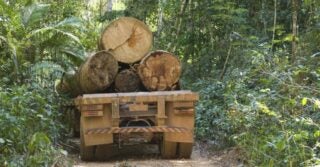- Resources
- Here’s how companies and foundations can prevent tropical deforestation and drive progress towards net zero commitments
Resources
Here’s how companies and foundations can prevent tropical deforestation and drive progress towards net zero commitments
Published: July 22, 2021 by EDF Staff
Ending tropical deforestation within the next decade is critical to preventing the worst effects of climate change. It, too, is necessary for protecting the homes and livelihoods of the Indigenous Peoples and local communities who depend on the forests.

Companies are showing increased ambition to prevent tropical deforestation, such as the groundbreaking LEAF coalition. This comes as stakeholders, including investors and consumers, are calling for greater transparency into food production and responsible sourcing. The majority of efforts, though, have been focused on individual supply chains.
Today, there’s growing recognition of the need for companies to work collaboratively to reduce deforestation and environmental impacts from agricultural production over an entire region.
The jurisdictional approach to reducing deforestation, is an effective solution for companies looking to work through their supply chains to meet deforestation goals, transform a production landscape and support local economies and communities. This is especially true now as companies are racing to drive down their climate footprint and work toward net zero by mid-century.
Jurisdictional approaches are a win for climate, businesses, and communities
Through Jurisdictional approaches, companies collaborate with local governments and stakeholders such as indigenous peoples, NGOs, foundations, and others across an entire region, including at the national or state level.
The Produce, Conserve, Include (PCI) strategy in Mato Grosso, Brazil aims to produce more agricultural commodities, conserve natural resources, and include smallholders and Indigenous People in economic development. Since the baseline years of 2001-2010, deforestation in Mato Grosso has been reduced by 69% (both in the Amazon forest and the Cerrado) and over 60% of native vegetation cover has been maintained.
The success of Mato Grasso’s PCI forest protection model has garnered broad support, and has sparked the onset of new opportunities for companies and foundations to engage in jurisdictional approaches.
3 examples of how to invest in forest protection in Mato Grosso today
Companies and their foundations can reduce tropical deforestation at scale and make progress against their climate goals. Here are three examples of how to get started today:
- The Soft Commodities Forum (SCF) brings together six major agribusinesses, including Cargill and Bunge, to advance collective action to engage directly with producers and collectively build suitable solutions to deforestation-free supply chains. Alongside PCI partners, the SCF is developing farm level assessments and implementing action plans to reduce deforestation in two municipalities in Mato Grosso.
- The PCI Pitchbook provides a “menu” of the on-the-ground programs in Mato Grosso that are ripe for corporate engagement. Both the pitchbook and the PCI Corporate Action Group help companies to understand how they can connect their supply chain efforts to the broader Mato Grosso PCI strategy as part of the “menu” of programs or when creating a new one. For example, Marfrig, a leading beef producer, also worked in alignment with the PCI, as part of their deforestation initiative called the Verde+ Plan.
- Foundations can provide philanthropic funding to help address the systemic drivers of deforestation by investing in forest protection and improving local livelihoods. For example, Walmart Foundation’s recent investment with The Instituto Centro de Vida (ICV) in Mato Grosso is providing technical support for local farmers to grow fresh produce and improve their negotiation skills. The initiative is increasing agricultural production, repurposing degraded land, reducing deforestation, and generating more income for farmers.
Companies and foundations can and must invest in tropical forest protection, because ultimately, we can’t solve climate change without it. And for companies that are investing in forest protection in jurisdictions beyond just Brazil, more opportunities exist. For example, the Tropical Forest Alliance, Commodities Jurisdiction Approach, and the Consumer Goods Forum’s Forest Positive Coalition of Action all provide resources to help end commodity-driven deforestation by driving full-sector transformation for key commodities.

